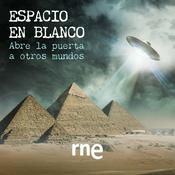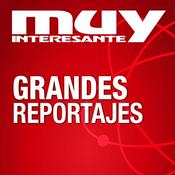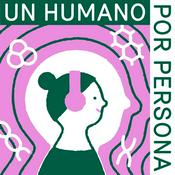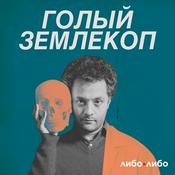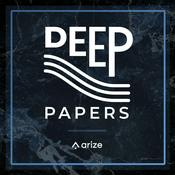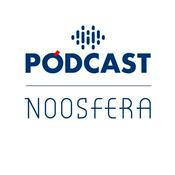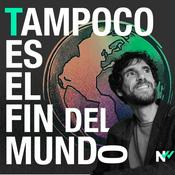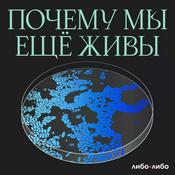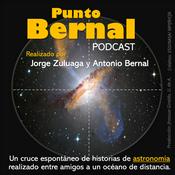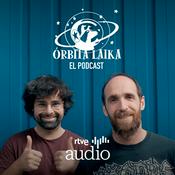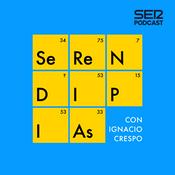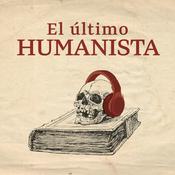91 episodios

Inside insight: How I set up a research repository in Notion
08/1/2026 | 35 min
Hi, I’m Nikki. I run Drop In Research, where I help teams stop launching “meh” and start shipping what customers really need. I write about the conversations that change a roadmap, the questions that shake loose real insight, and the moves that get leadership leaning in. Bring me to your team.Paid subscribers get the power tools: the UXR Tools Bundle with a full year of four top platforms free, plus all my Substack content, and a bangin’ Slack community where you can ask questions 24/7. Subscribe if you want your work to create change people can feel.Learn exactly how I’ve set up many a repository in Notion — I use this set up for in-house, consultancy, and advisory clients. It’s one of my most popular set-ups and I highly recommend trying it and getting feedback from your stakeholders.Let me know if you have any questions!Link to the Notion pageInterested in sponsoring the podcast?Interested in sponsoring or advertising on this podcast? I’m always looking to partner with brands and businesses that align with my audience. Reach out to me at [email protected] to learn more about sponsorship opportunities! This is a public episode. If you'd like to discuss this with other subscribers or get access to bonus episodes, visit www.userresearchstrategist.com/subscribe

Jobs to Be Done Without the Dogma | Wolfram Nagel (TeamViewer)
30/12/2025 | 25 min
Listen now on Apple, Spotify, and YouTube.—Wolfram is a Senior UX Designer and Researcher and has been working at TeamViewer for eight years.He has been driving and advancing UX Research at the company for nearly two years, developing it further together with a young but highly talented and motivated team. He has been deeply involved with Jobs-to-Be-Done for over a decade and considers himself a pragmatic JTBD practitioner.Before joining TeamViewer, he spent almost ten years in the Enterprise Content Management space and have been focusing on Multi-Device Experiences since the mid-2010s. He is the author of “Multiscreen UX Design” and has been passionately engaged in UX and design for around 25 years. His expertise lies in Jobs-to-Be-Done, hands-on and pragmatic UX research, as well as content design and content management. He regularly and enthusiastically participates in webinars, meetups, and conferences.Beyond UX and design, he enjoys photography, particularly nature and bird photography, and loves spending time with his family. In the past, he was an avid groundhopper, traveling across Europe with friends to attend football matches.In our conversation, we discuss:* Why it helps to think of every user action as a “job” with a real outcome, not just a task or step.* The messy overlap between jobs, goals, use cases, and what stakeholders think they want.* Why most teams start in the solution space and how to bring Jobs thinking in without derailing the train.* What an actual “job” sounds like in the wild, and how to spot one inside complaints, workarounds, and feature requests.* Why Wolfram keeps outcome-driven language like “minimize the time it takes to…” as a rule and how it makes your findings way more usable.Some takeaways:* Jobs to Be Done is a lens. Wolfram doesn’t wait for permission to use JTBD thinking. Whether he’s asked for a usability test or feedback on a feature, he still pulls out the job behind it. Why? Because understanding the job gives you reusable insights that don’t die with the feature.* Stop obsessing over the perfect term. Stakeholders just need to get it. Wolfram avoids technical jargon like “JTBD” when introducing the concept. He uses terms they already know, like “use cases” or “problems,” so they’re not thrown off. The focus is clarity, not vocabulary.* Your users are already giving you jobs, you just have to listen for them. Complaints, feature requests, emails, even rants. All of these hold clues about what someone was trying to do. If you dig in with curiosity (and a few “tell me more”s), you can usually find the real goal underneath the noise.* Do it late if you must but do it anyway. Sometimes research doesn’t happen until the build is already underway. That doesn’t mean you skip the problem space. Wolfram brings in JTBD insights midstream, not to stop the train, but to nudge it toward stronger value delivery and set up better decisions next time.* Your feature might flop but your jobs research won’t go to waste. If the solution turns out to be unworkable or doesn’t land, you don’t have to throw away the research. JTBD insights stay valid. They’re reusable, solution-agnostic, and can fuel the next iteration or a totally new idea.Where to find Wolfram:* Multiscreen UX Design (book)* Website* LinkedIn* Twitter/XStop piecing it together. Start leading the work.The Everything UXR Bundle is for researchers who are tired of duct-taping free templates and second-guessing what good looks like.You get my complete set of toolkits, templates, and strategy guides. used by teams across Google, Spotify, , to run credible research, influence decisions, and actually grow in your role.It’s built to save you time, raise your game, and make you the person people turn to—not around.→ Save 140+ hours a year with ready-to-use templates and frameworks→ Boost productivity by 40% with tools that cut admin and sharpen your focus→ Increase research adoption by 50% through clearer, faster, more strategic deliveryInterested in sponsoring the podcast?Interested in sponsoring or advertising on this podcast? I’m always looking to partner with brands and businesses that align with my audience. Book a call or email me at [email protected] to learn more about sponsorship opportunities!The views and opinions expressed by the guests on this podcast are their own and do not necessarily reflect the views, positions, or policies of the host, the podcast, or any affiliated organizations or sponsors. This is a public episode. If you'd like to discuss this with other subscribers or get access to bonus episodes, visit www.userresearchstrategist.com/subscribe

Pragmatism vs. Rigor: The Researcher’s Balancing Act | Raymond Tiong (Dext)
11/12/2025 | 27 min
Listen now on Apple, Spotify, and YouTube.—Ray is a designer-turned-researcher. He grew up in New Zealand but moved to the UK last year.His career started in graphic design and advertising, but he’s also studied art history and worked as a brand strategist and innovation consultant before moving into UX. He was a product designer before officially pivoting to UX research.He is passionate about the craft of UX research, so is naturally drawn towards rigour and detail. But there’s definitely a balance to be mindful of, so lately he’s been enjoying the challenge of taking a more pragmatic approach to cut through the noise at work and maximise impact.In our conversation, we discuss:* How Raymond moved from design to research and why his messy, creative path helps him make peace with constraints.* Why “just enough” research is often the most realistic (and still valuable) kind.* Dealing with stakeholders who want statistical significance and to act on N=1 quotes.* What makes a one-pager actually work (hint: it’s not cramming 14 bullet points into 10pt font).* How to reframe constraints as creative challenges, instead of just reasons to cry in a spreadsheet.Some takeaways:* Rigor isn’t one thing. There’s a difference between medical research and a usability test for a SaaS dashboard. Raymond reminds us to stop chasing perfection and start asking: What’s the risk? What’s the goal? What’s actually good enough here?* You don’t have to be the loudest voice in the room to be the expert. Sometimes the best way to build trust is not to say “trust me, I’m the expert,” but to bring the right method to the table and explain why it fits. Raymond shares how he uses method knowledge to guide teams—without pulling rank.* Constraints aren’t the enemy, they’re the brief. That tight deadline or limited budget? Treat it like a design prompt. What can you strip away? What creative method still works? That shift in mindset changes everything from energy to output.* Scoping is where the real power is. Raymond shares a sharp approach to collaborative scoping: show a strawman plan and let stakeholders rip it apart. It builds alignment faster and helps surface hidden assumptions, risks, and trade-offs without ego wars.* Your research summary isn’t for you. Your one-pager should pass the 40-second CEO elevator ride test. Raymond breaks down his 3-column template and shares why the takeaways column matters more than your favorite quote or clever insight. It’s about what they need to do next.Where to find Raymond:* ADPList mentor profile page* LinkedIn* Medium Stop piecing it together. Start leading the work.The Everything UXR Bundle is for researchers who are tired of duct-taping free templates and second-guessing what good looks like.You get my complete set of toolkits, templates, and strategy guides. used by teams across Google, Spotify, , to run credible research, influence decisions, and actually grow in your role.It’s built to save you time, raise your game, and make you the person people turn to—not around.→ Save 140+ hours a year with ready-to-use templates and frameworks→ Boost productivity by 40% with tools that cut admin and sharpen your focus→ Increase research adoption by 50% through clearer, faster, more strategic deliveryInterested in sponsoring the podcast?Interested in sponsoring or advertising on this podcast? I’m always looking to partner with brands and businesses that align with my audience. Book a call or email me at [email protected] to learn more about sponsorship opportunities!The views and opinions expressed by the guests on this podcast are their own and do not necessarily reflect the views, positions, or policies of the host, the podcast, or any affiliated organizations or sponsors. This is a public episode. If you'd like to discuss this with other subscribers or get access to bonus episodes, visit www.userresearchstrategist.com/subscribe

Beyond the Report | Matt Thomas (Motability Operations)
25/11/2025 | 26 min
Listen now on Apple, Spotify, and YouTube.—Matt Thomas is a Design, Research, and Product leader at Motability Operations where he leads the Design and Research efforts for a range of products, from a commerce platform for selling used cars to colleague-facing tools that support that website. His team also designs for a vehicle refurbishment workshop, a completely different challenge with a unique set of users, which keeps things interesting.They work closely with Product and Technology teams to bring these products to life, always focusing on learning from the people who use them. He is super passionate about broadening where the team gathers insights and making research more accessible, so teams can make better product decisions.In our conversation, we discuss:* How Matt defines “broadening research” and why it starts outside of formal studies.* Real-world examples of overlooked insight sources like sales calls, account managers, and field teams.* The internal system Matt’s team uses to collect, tag, and feed sales feedback into their repository every day.* Why traditional research reports don’t always land and what to try instead.* Tactics for building trust and buy-in, even when you’re blocked from direct customer access.Some takeaways:* Matt encourages researchers to stop thinking of research as only formal studies. Some of the richest data comes from support calls, onboarding conversations, and field visits. These sources already exist in most companies but often get ignored because they don’t look like traditional research. When you tap into them, you’re bringing context into the room that would otherwise stay invisible.* It’s tempting to jump straight into tagging or setting up automations, but Matt suggests beginning with a conversation. Ask a customer-facing teammate what they’re hearing. Offer to sit with them for an hour or buy them coffee. Building trust first, then showing how their insights feed into decisions, opens more doors long-term than asking for data access right away.* Matt’s team gets sales feedback emailed to them daily and loads it into their repository in batches. But even without automation, he recommends reviewing 20 feedback items a day which is just enough to build a habit and gather useful patterns. That creates a log of real impact you can use later to justify hiring or tooling decisions. Don’t aim to boil the ocean; aim to show traction.* The goal isn’t to create a polished report. It’s to influence a decision. Matt’s team shares snippets via Slack or email, hosts research gallery walk-throughs, and tests lightweight formats like social-style insight posts. Different stakeholders need different communication and just because a report is well-written doesn’t mean it will be read.* From usability bingo nights to Iron Man-style gallery sessions, Matt embraces experimentation in how research is shared. Some people need a sticky note wall. Some need a voice clip in their inbox. If one format doesn’t land, try another. The most impactful insights often come wrapped in something a little unexpected but perfectly timed.Where to find Matt:* LinkedInStop piecing it together. Start leading the work.The Everything UXR Bundle is for researchers who are tired of duct-taping free templates and second-guessing what good looks like.You get my complete set of toolkits, templates, and strategy guides. used by teams across Google, Spotify, , to run credible research, influence decisions, and actually grow in your role.It’s built to save you time, raise your game, and make you the person people turn to—not around.→ Save 140+ hours a year with ready-to-use templates and frameworks→ Boost productivity by 40% with tools that cut admin and sharpen your focus→ Increase research adoption by 50% through clearer, faster, more strategic deliveryInterested in sponsoring the podcast?Interested in sponsoring or advertising on this podcast? I’m always looking to partner with brands and businesses that align with my audience. Book a call or email me at [email protected] to learn more about sponsorship opportunities!The views and opinions expressed by the guests on this podcast are their own and do not necessarily reflect the views, positions, or policies of the host, the podcast, or any affiliated organizations or sponsors. This is a public episode. If you'd like to discuss this with other subscribers or get access to bonus episodes, visit www.userresearchstrategist.com/subscribe

Getting Strategic with Triangulation | Brett Kurjewski (Accelerant Research)
13/11/2025 | 27 min
Listen now on Apple, Spotify, and YouTube.—Brett Krajewski is the Vice President of Research & Growth at Accelerant Research, where he leads the research and client solutions teams, delivering innovative insights to empower businesses and many fortune 500 companies. He was most recently featured on an episode of Awkward Silences Podcast, and has some upcoming webinars. With a career spanning both in-house industry roles and consulting/agency leadership, Brett has built and led high-performing, multi-method research teams for Fortune 50 companies. His past roles include Head of Design Research: Customer at Walmart and Lead of Product Research at Lowe’s, where he drove customer-focused innovation and strategy. Beyond professionally, Brett has trained Seeing Eye dogs for the past 25 years, combining his love of service and animals, and is also a licensed pilot who enjoys navigating the skies somewhere new whenever possible. Brett’s unique blend of professional expertise and personal passions reflects his curiosity, drive, and commitment to making an impact.In our conversation, we discuss:* How Brett discovered triangulation only later in his career and why it changed everything about how he approached impact.* What meta-analysis actually means in practice, and why it’s an underrated starting point for faster, smarter research.* Why researchers need to stop acting like lone wolves and start working like strategic collaborators.* How to balance qualitative and quantitative data without waiting for things to be perfect.* The small, consistent actions that build trust and how they differ when you’re in-house versus agency-side.Some takeaways:* Early in his career, Brett saw research as “the answer.” Later, he realized that data triangulation, pulling from primary research, internal metrics, heuristics, and third-party sources, helped him tell richer, more balanced stories that actually got traction. It wasn’t about perfection or overloading people with data. It was about showing how user needs and business goals intersect, and building stories from multiple truths rather than a single source.* Rather than constantly commissioning new work, Brett champions meta-analysis, which involves reviewing what’s already been done across different departments. That might include past research, customer insights, agency data, or marketing reports. Doing this upfront reveals known truths, uncovers gaps, and often means you only need to research 2 out of 10 questions, not all 10. It makes you faster, more relevant, and a better partner to the business.* Trying to solve everything at once kills momentum. Brett advises researchers to start with small, tangible wins, like answering two key questions fast with an unmoderated test. Showing up early with something useful, rather than disappearing and delivering a polished report weeks later, builds credibility. These quick contributions earn you the right to do deeper, more strategic work down the line.* Too many researchers say they want a seat at the table, then go off and work solo. Brett emphasizes bringing stakeholders along for the ride and letting them weigh in, see progress, and feel ownership. That doesn’t mean caving to their agenda. It means understanding what they care about, folding it into your framing, and using that shared language to build alignment and influence.* One of the most powerful habits Brett adopted: releasing insights in milestones. Whether you’re in-house or agency, think in chunks, such as sharing the competitive analysis while you’re still synthesizing interviews. Share directional trends while still in the field. Transparency builds trust, helps teams move faster, and reminds everyone that research is ongoing, not just a one-time delivery. Show them how the sausage is made, not just the final plate.Where to find Brett:* LinkedIn* Transforming Insights into Results: Advancing influence in Corporate landscapes from the bottom up* Innovate or Imitate: Redefining Design and Research on our Terms Stop piecing it together. Start leading the work.The Everything UXR Bundle is for researchers who are tired of duct-taping free templates and second-guessing what good looks like.You get my complete set of toolkits, templates, and strategy guides. used by teams across Google, Spotify, , to run credible research, influence decisions, and actually grow in your role.It’s built to save you time, raise your game, and make you the person people turn to—not around.→ Save 140+ hours a year with ready-to-use templates and frameworks→ Boost productivity by 40% with tools that cut admin and sharpen your focus→ Increase research adoption by 50% through clearer, faster, more strategic deliveryInterested in sponsoring the podcast?Interested in sponsoring or advertising on this podcast? I’m always looking to partner with brands and businesses that align with my audience. Book a call or email me at [email protected] to learn more about sponsorship opportunities!The views and opinions expressed by the guests on this podcast are their own and do not necessarily reflect the views, positions, or policies of the host, the podcast, or any affiliated organizations or sponsors. This is a public episode. If you'd like to discuss this with other subscribers or get access to bonus episodes, visit www.userresearchstrategist.com/subscribe
Más podcasts de Ciencias
Podcasts a la moda de Ciencias
Acerca de The User Research Strategist: UXR | Impact | Career
Escucha The User Research Strategist: UXR | Impact | Career, Materia Oscura y muchos más podcasts de todo el mundo con la aplicación de radio.es
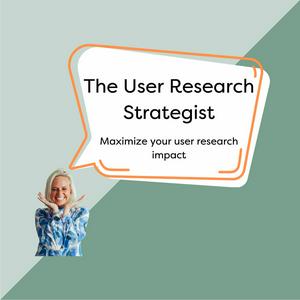
Descarga la app gratuita: radio.es
- Añadir radios y podcasts a favoritos
- Transmisión por Wi-Fi y Bluetooth
- Carplay & Android Auto compatible
- Muchas otras funciones de la app
Descarga la app gratuita: radio.es
- Añadir radios y podcasts a favoritos
- Transmisión por Wi-Fi y Bluetooth
- Carplay & Android Auto compatible
- Muchas otras funciones de la app


The User Research Strategist: UXR | Impact | Career
Descarga la app,
Escucha.

